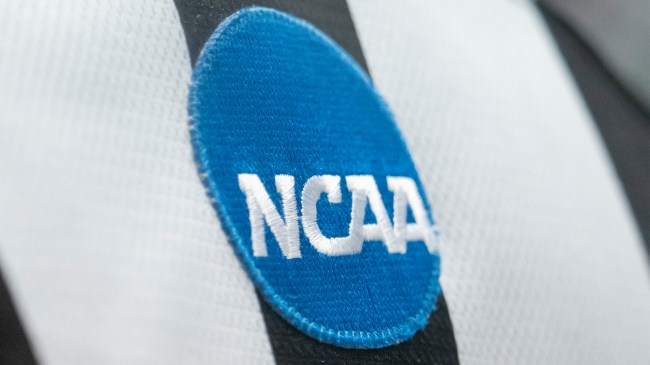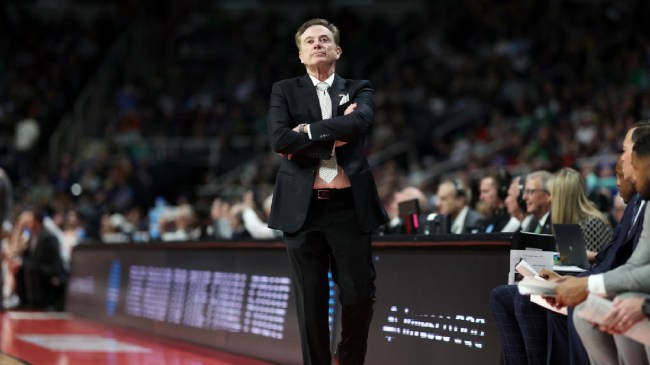
Getty Image
It’s probably too soon to say college sports have reached a point where recruiting scandals have become a thing of the past, but the advent of the NIL Era means a number of controversies that took the NCAA by storm would probably never unfold in this day in age.
Sure, there are still plenty of schools that will find a way to attract the wrath of the NCAA, but it’s also much harder to get away with skirting the rules than it once was.
Recruiting scandals come in many shapes and sizes, but when I use that term, I’m mostly referring to the “fun” ones as opposed to those defined by “improper contact” or relatively mundane benefits; the ones involving private jets, drug-filled parties, and duffel bags filled with piles of cash.
At the end of the day, the best programs will always figure out a way to land the top recruits, but the strategies they now turn to are slightly different than the ones they deployed in a previous era; if there’s a way to get a kid interested in a specific school (whether it’s building a Chick-Fil-A or the lure of sharing a campus with a famous TikTok star), they’re going to exploit it as much as possible.
Again, there will always be plenty of student-athletes and schools who manage to find a way to end up in hot water, but it feels like the big-time recruiting scandals that had the potential to rock the entire college sports landscape to its core are going to be relatively few and far between.
There’s no telling what the future holds, but at least we can take a look at some of the craziest stories to surface in the past.
The wildest recruiting scandals in NCAA history
Stephon Marbury and Georgia Tech
Hailed as one of the best players out of a talent-packed recruiting class, there were plenty of college basketball programs angling to secure a commitment from Stephon Marbury, who made quite a name for himself at Lincoln High School in Brooklyn.
Starbury” (as he eventually became known) was a wanted man to the point where Georgia Tech supposedly spent more than $7,500 to court him during an official visit that included a private jet, a weekend stay at the Occidental Hotel, and catered meals at the home of head coach Bobby Cremins.
Flying privately for anyone of any age is an extremely unnecessary way of travel, but certainly at the height of luxury. With that said, sending a high school kid from Brooklyn on a private jet for a trip that lasts for around two hours is an insane thing to add to the company credit card.
However, Georgia Tech did exactly that—and it might have been worth it when you consider he ended up signing with the Yellow Jackets and played at the level they expected him to (only to leave after one year and become the 4th overall pick in the 1996 NBA Draft).
It makes you wonder what other schools did not only for Marbury but other recruits as well.
The Oklahoma State football “hostesses”
In the South, life tends to be defined by the following hierarchy: God, Family, and Football. Teams there will do anything and everything necessary to be good and Oklahoma State is no exception.
In a report that surfaced in 2013, some former members of the Cowboys said that recruits were not only wined and dined but apparently were offered the services of “hostesses” who would get, um, very up close and personal with them during the visits.
You don’t need to be a genius to understand why that tactic would work on a bunch of high schoolers trying to decide where they want to take their talents, and while it may have been unethical and potentially illegal, it certainly seemed to work.
LeRon Furr—a former linebacker at OSU during the 2009 and 2010 seasons—told Sports Illustrated that these hostesses “knew they had to show the players a good time and [get them to Oklahoma State],” which included giving them access to alcohol, marijuana, and certain carnal pleasures” (although he denied taking advantage of the last offering).
The hostesses—part of a group called the “Orange Pride”—were seemingly “hired” by the football program and would work their magic at night with the players. However, they were also asked to “volunteer” two hours a week in the program’s offices stuffing envelopes and answering phones to assist with recruiting efforts.
While they were required to sign a document stating that they would “use appropriate conduct” while interacting with recruits, Furr (along with some other former players) assert that was definitely not the case.
Seems like it was a well-oiled machine down there in Stillwater.

Getty Image
Louisville basketball & Rick Pitino
The Louisville Basketball scandal is one of my favorites partially because I remember getting to able watch it unfold
For the uninitiated, things took a turn in 2016 when at least three people who were recruited to play basketball for the Cardinals told NCAA investigators they attended parties inside a dorm on campus.
On the surface, that doesn’t seem too scandalous, but that term definitely applies when you consider they asserted the gatherings were filled with strippers and escorts who offered their services.
It’s worth nothing this wasn’t a “Don’t Ask, Don’t Tell’ situation like the one with the Orange Pride; money changes hands under the explicit instructions the women should engage in explicit acts to get the recruits on campus and play for Rick Pitino.
It all came crashing down when Katina Powell (a self-described “former escort”) discussed the parties in her book Breaking Cardinal Rules: Basketball and the Escort Queen.
In the book, Powell described her business dealings with former Louisville Grad Assistant and Director of Operation Andre McGee. She claims that McGee paid her $10,000 to supply dancers and escorts to parties that occurred with basketball recruits that were specifically designed to get the commitment signed.
After the book was published, more players came forward to corroborate the claims and it quickly became a nightmare for Louisville and Pitino (some said the girls at the parties were “clearly not in college,” and others revealed McGee also provided the recruits with money).
While Pitino denied everything, this story (along with a few other risqué anecdotes) ultimately led to his demise at the helm in Louisville.
Nevin Shapiro and the Miami Hurricanes
Would this even be an article if Miami wasn’t mentioned?
If you’ve seen the 30 For 30 dubbed “The U,” you’re probably familiar with disgraced Hurricanes booster Nevin Shapiro and the many scandals linked to the football team. This isn’t even a single incident, as various recruiting violations happened on a regular basis for an impressive amount of time.
In 2010, Shapiro was charged with running a massive Ponzi scheme that scammed investors out of more than $930 million, and he used some of those funds to provide thousands of impermissible benefits to at least 72 athletes at Miami between 2002 and the year it all came crumbling down 2010.
Shapiro said his eight-year run cost him millions of dollars in benefits, which he spent on cash payments, jewelry, travel, prostitutes, trips to high-end restaurants and nightclubs, outings at his multimillion-dollar homes and on his luxury yacht, bounties for on-field play, and (on one occasion) an abortion.
This guy wasn’t even a coach, a former player, or even an alum (he actually graduated from the University of South Florida). He was simply a booster who decided to hitch his wagon to Miami and wanted to see the team succeed.
To achieve that goal, Shapiro started a sports agency that essentially acted as a recruiting firm for The U. He would funnel cash and benefits to players to keep them happy and get them to Miami (in one instance, Shapiro said that he handed over a lump sum of $50,000 to Vince Wilfork).
On top of his benefits to players, Shapiro described acts in the article that put him in multiple NCAA violation categories—including impermissible compensation of coaches.
It’s insane to think the entire program seemed to endorse what Shaprio was doing—but it’s hard to argue it didn’t work.